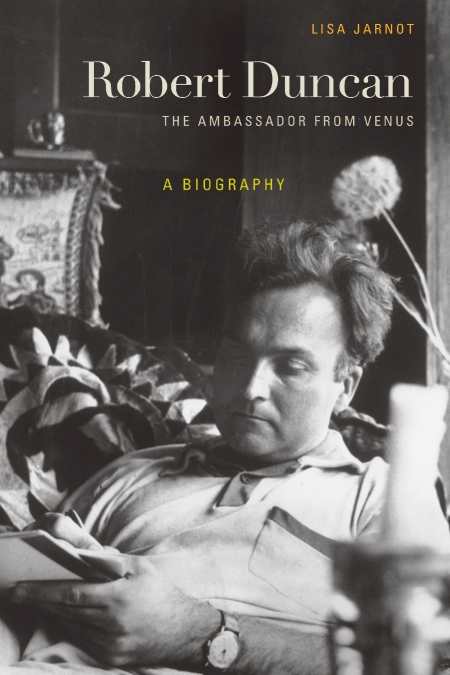Robert Duncan
The Ambassador from Venus
Robert Duncan, we learn in the first few pages, was adopted by a theosophist couple who happened to be looking for a boy born at precisely the date and time that he was born. His birth mother, Marguerite, died hours after Robert was born, and his father’s grief rendered him incapable of caring for Robert and his siblings. In a series of coincidences worthy of a soap opera, the theosophist couple found out about Robert and adopted him. The rest is history, and the reader is sucked into Duncan’s life as though she or he was reading a well-crafted suspense novel.
It is a testament to Jarnot’s mastery of her craft that she can simultaneously tell a good story, imbue her prose with a subtly dry sense of humor, and write a balanced, critically astute biography of one of the most important poets of the twentieth century. Never veering into unnecessarily lascivious territory, even though it’s obvious when reading the biography that this could easily happen in a lesser writer’s hands, Jarnot writes what is necessary to illustrate Duncan’s sex life, keeping it relevant to the poet’s work.
This biography centers itself on the body of work that Duncan produced in his lifetime and his public role as a poet. All the vignettes, anecdotes, and quotations that Jarnot uses (and she is generous with her inclusion of insights from family members, lovers, and friends who were often poets) are relevant to an understanding of how Duncan viewed poetry, and his relationship to it.
As is the case in many biographies, the subject is not entirely likeable or very sympathetic, and yet one is impressed by his dedication to his craft. Duncan’s career was a long and fruitful one, and like his contemporary, Allen Ginsberg (who, as it happens, was impressed as a young, pre-“Howl,” poet, with Duncan’s intensity), his influence on American poetry, on both coasts, was as impressive as his poetry itself.
Jarnot’s book is useful in several respects: as a well-documented and exhaustively researched biography of Duncan, as an overview of the poetry being produced in the mid-twentieth century on both coasts, and, finally, as a source of insight into the lives of many other poets and artists with whom Duncan interacted (we find a telling psychological profile of avant-garde filmmaker Stan Brakhage, learn about the trepidation Anaïs Nin felt upon moving to New York City, and get a rare glimpse into fellow poet Robert Creeley’s troubled first marriage). For all these reasons, Jarnot’s biography is an edifying study of a poet who did much to inspire the next generation of poets, and it is an entertaining life story. This book should be looked to as a template for other biographies of twentieth-century poets.
Reviewed by
Daniel Coffey
Disclosure: This article is not an endorsement, but a review. The publisher of this book provided free copies of the book to have their book reviewed by a professional reviewer. No fee was paid by the publisher for this review. Foreword Reviews only recommends books that we love. Foreword Magazine, Inc. is disclosing this in accordance with the Federal Trade Commission’s 16 CFR, Part 255.

